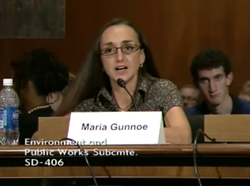'Mountaintop removal is a human rights issue'
 A U.S. Senate subcommittee held a hearing yesterday on the impacts of mountaintop removal coal mining on water quality in Appalachia, and the proceedings suggest there's a consensus developing that the practice needs to be stopped.
A U.S. Senate subcommittee held a hearing yesterday on the impacts of mountaintop removal coal mining on water quality in Appalachia, and the proceedings suggest there's a consensus developing that the practice needs to be stopped.
The hearing of the Subcommittee on Water and Wildlife was called by Sen. Ben Cardin (D-Md.), who with Sen. Lamar Alexander (R-Tenn.) is a co-sponsor of the Appalachia Restoration Act (S. 696). The bill would add language to the federal Clean Water Act prohibiting the dumping of mine waste into streams, effectively ending mountaintop removal mining. The practice -- which involves blasting off the tops of mountains and dumping the waste in the valley below -- has already ruined more than 500 mountains while burying an estimated 1,200 miles of ecologically critical headwater streams under tons of mining waste.
"It's not necessary to destroy our mountaintops in order to have enough coal," Alexander said in his opening statement. "Saving our mountaintops is important to me."
Testifying at the hearing were John "Randy" Pomponio, director of the Environmental Protection Agency's Environmental Assessment and Innovation Division in the agency's mid-Atlantic region; Paul Sloan, deputy commissioner of the Tennessee Department of Environment and Conservation; Randy Huffman, secretary of the West Virginia Department of Environmental Protection; Dr. Margaret Palmer, director of the University of Maryland's Chesapeake Biological Laboratory; and Maria Gunnoe, an organizer with the Ohio Valley Environmental Coalition and a West Virginia resident whose own property has been devastated by mountaintop removal mining operations.
The first witness to testify was Pomponio, who said the EPA plans to exercise greater authority under the Clean Water Act to lessen the impacts of mountaintop removal, noting that too many headwater streams are being polluted by the practice. He was followed by Sloan, who reported that Tennessee doesn't permit burial of streams through so-called "valley fills," saying there was "no justification" for the practice.
Next up was Huffman, who sounded more like an official in charge of protecting mining than the environment. His greatest concern, he said, was the "uncertain regulatory environment" the EPA has created with its efforts to more strictly oversee surface mining. "West Virginia and our nation needs jobs and needs coal," Huffman declared. "People who live in the steep, narrow terrain of southern West Virginia need the opportunities presented by surface mining."
The day's most urgent voice belonged to Gunnoe (in photo), a resident of West Virginia's coalfields and this year's winner of the Goldman Environmental Prize. She told of how she began organizing against mountaintop removal after the mountain hollow where she has lived her entire life was flooded by a mining operation in 2003 -- an incident that literally washed away about five acres of her land. She described the incessant blasting going on around people's homes, the resulting poor air quality and the polluted water from the valley fills. She also talked about the job loss for miners associated with mountaintop removal, pointing out that there were 150,000 mining jobs in the state in 50 years ago but less than 15,000 today.
"Mountaintop removal is absolutely not about jobs," Gunnoe said. "Mountaintop removal is a human rights issue. Myself and my children have a right as U.S. citizens to clean water, and that right is being taken away from us in West Virginia."
The last witness to testify was Palmer, who works in Maryland but has a home in West Virginia. She discussed the critical ecological importance of headwater streams and noted that contamination from mining travels great distances downstream, impacting the health of fish and other life that depends on the water. She was also sharply critical of West Virginia's attempts to mitigate the damage by building new streams, which she said were really nothing more than rocky ditches.
She drew a comparison to her husband, who she said was a "really good-looking guy" who's tall and slim but who despite outward appearances suffers from high blood pressure. Just as a doctor shouldn't give him a clean bill of health because he looks healthy, neither should we look at these man-made streams and say they're ecologically healthy.
"Is there evidence that mitigation is actually working?" Palmer said. "I'm very sorry to say that unfortunately it's not working. Mountaintop removal mining causes permanent environmental impacts."
Cardin said he plans to hold additional hearings on the topic. In the meantime, the Appalachia Restoration Act remains under consideration in the Senate Committee on Environment and Public Works.
Tags
Sue Sturgis
Sue is the former editorial director of Facing South and the Institute for Southern Studies.
